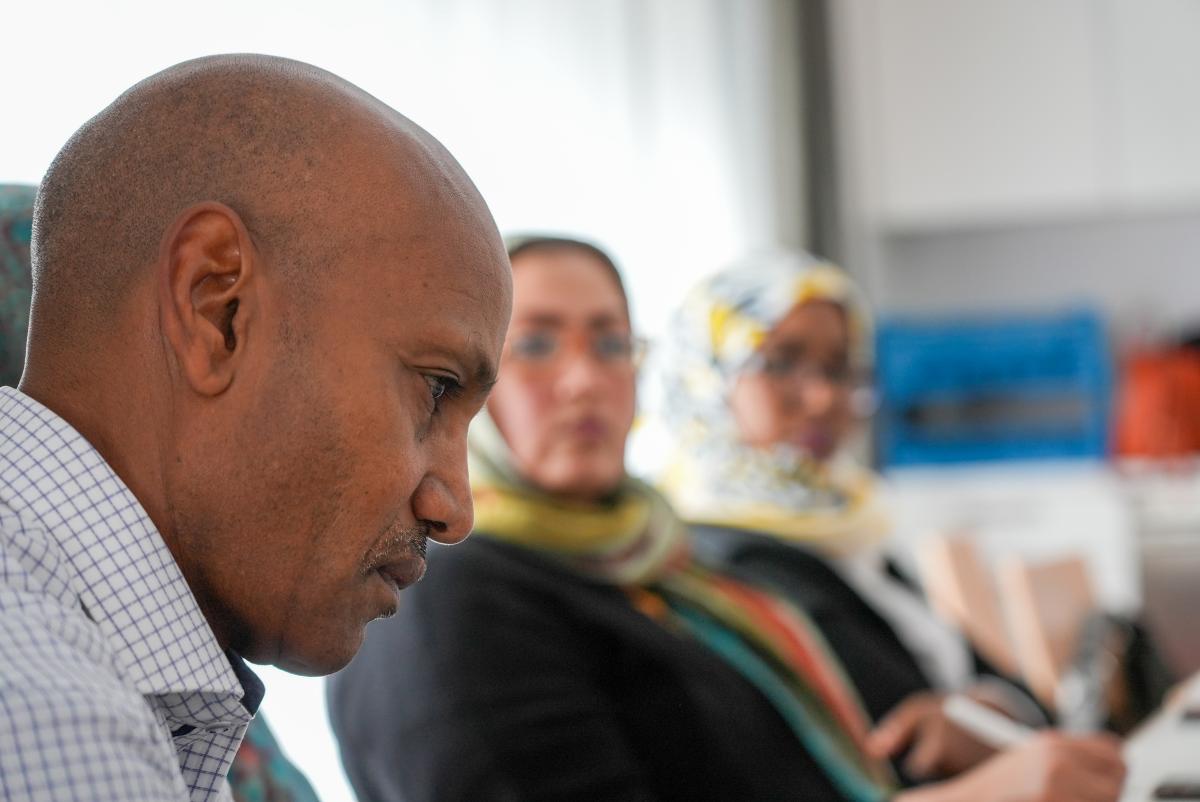Around the large table in the meeting room in Zurich sit about 10 women and men. In between, some children run around and take some of the sweets from the table, including Swiss Schoggistängeli and Sudanese Baklava.
The Sudanese have come together from different parts of Switzerland. They have only recently officially formed as a local organisation. But the community - most of its members are women- has been present in our country for more than 20 years. At first, they met mainly for social reasons, explains el-Wathig el-Gozoli, who is sitting at the table preparing the speaker for the meeting with Zephania Amuiri, Senior Liaison Advisor for UNHCR´s Regional Bureau for East, Horn and Great Lakes region of Africa.
"But when the war broke out, we realized we had to do more."
It's kind of a forgotten war. In this country, we don't learn too much about what's happening in northeast Africa. For el-Wathig el Gozoli, this is no surprise: Sudan is far away from Switzerland, so people here know very little about the country. The media are not really interested either, el-Wathig el-Gozoli continues. But what they hear from their relatives and neighbours in Sudan is frightening:
"It's not just the official fighting. Civilians are being deliberately attacked; women are victims of sexual violence. It's our job to educate people here about how bad the situation really is."

The violent clashes between the Sudanese Armed Forces (SAF) and the paramilitary Rapid Support Forces (RSF) had erupted in mid-April. Since then, more than 5 million people have already been forced to flee. Many of them sought refuge in neighbouring countries, such as Chad, South Sudan or Ethiopia. But even there, the situation is very difficult, and refugees are in urgent need of water, food, safe shelter and medical care. For UNHCR, the UN Refugee Agency, the conflict in Sudan is an emergency situation. Aid workers and partner organizations are doing their best - but resources are scarce. Unlike some other conflicts, like, for example, the war in Ukraine, the global population has not shown itself particularly concerned or interested in donating when it comes to Sudan.
The Sudanese community in Switzerland has raised money and donated to UNHCR. Despite the conflict, all members of the community agreed to remain politically impartial. They simply cared about the victims. That's why they are planning more aid and would like to expand their cooperation with UNHCR, says Nagla Fathi. As a mother of three, she is especially concerned about the children in Sudan.
"Many of them can no longer go to school. They don't know what their future will be. These young people desperately need access to educational institutions so they can build a life for themselves."
The Sudanese are a very open and hospitable people, always concerned about others, Nagla Fathi adds. This is also reflected in the fact that Sudan has always been one of the countries in Africa that has taken in the most refugees. But now it urgently needs help itself.
All members of the Sudanese community somewhat understand why the Swiss don’t show as much solidarity towards Sudan. "The country is far away, the situation is chaotic," explains Gibreil Hamid. He is from Darfur in western Sudan and has not heard from his family for five months. He can't contact them, can't even send money: The Internet, mobile networks and banks no longer work.
"But it is our job to make the population here aware of the situation. We are not doing enough yet, we need to get out on the streets more. We also need to assist humanitarian organizations better because their access is limited in Sudan."
Zephania Amuiri of UNHCR shares the same opinion. He is connected online, and the Sudanese in the meeting room in Zurich are allowed to ask him questions. What kind of help can UNHCR provide on the ground? Where are the aid workers present? There are areas that still cannot be entered for security reasons. But they are working on it, Zephania Aimuri states. And he is very touched by the commitment of the Sudanese community in Switzerland.
Sudan has been rocked by crises for decades. Time and time again, there have been military coups, outbreaks of violence, and now civil war. Sudanese society is made up of many different peoples and tribes.
"When this war ends, the population will finally see itself as one," Gibreil Hamid is convinced. "Origin does not matter; we are all simply Sudanese."
In such violent conflicts, he says, everyone suffers equally, especially the innocent. And he knows that the Swiss people are very generous when it comes to humanitarian aid. But they aren´t yet aware of the inhumanity of what is currently going on in Sudan. "The people here didn't wait for us," el-Wathig el-Gozoli clarifies. "It is my duty to reach out to the people and tell them my story. That way we can help the victims together." And Nagla Fathi is convinced: "Even one Swiss Franc can make a difference."
You can support refugees from Sudan by sharing the news about what is going on there, or also making a donation. Together we can make a difference and make the situation in this African country a little better known to the general public.
And if you'd like to have a deeper, more emotional look at Sudan, please watch the video of Gibreil Hamid here.